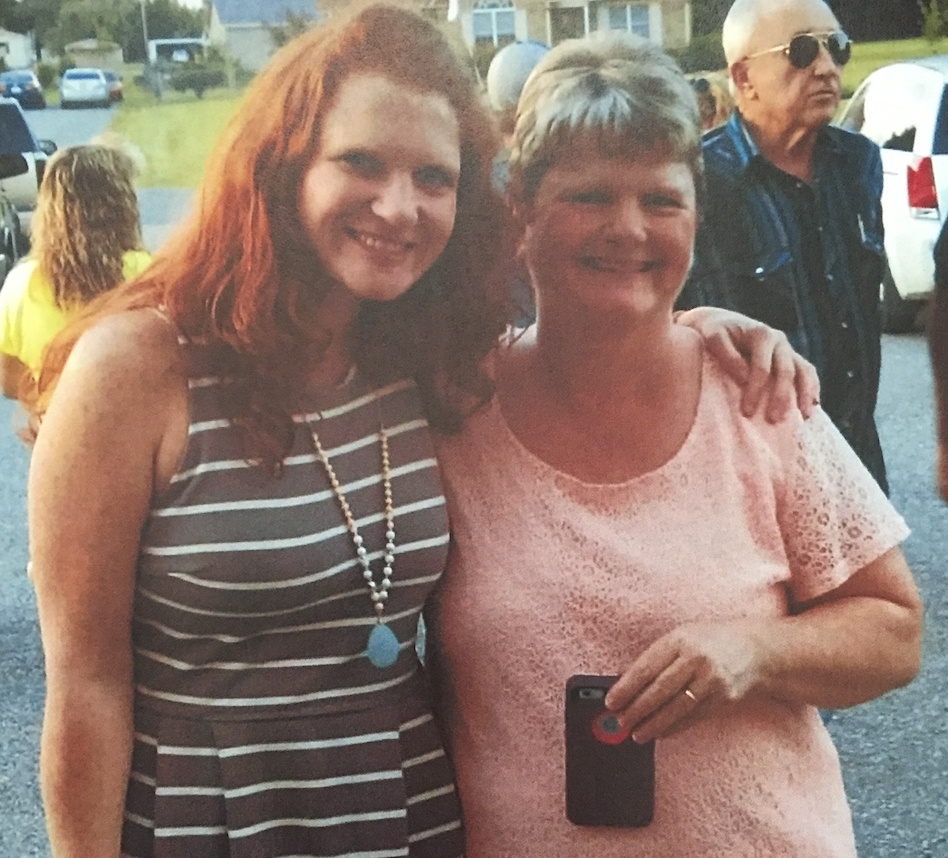Robin Jordan said she can remember every detail of May 12, 2018. She was driving two of her three daughters and her granddaughter, her oldest daughter Jessica’s child. They were on their way to see Jordan’s son at work. It was his birthday.
“My husband called me and wanted to know where I was,” Jordan said. “He said, ‘You need to come home right now.’ I just did a take in my brain of where everyone was at that moment.”
Jordan said she knew it had to be about her sister or Jessica. When she got to her home in Graham, she found two detectives in her living room.
 Photo Courtesy of Robin Jordan.
Photo Courtesy of Robin Jordan.Left to right: Jessica Jordan with her mother, Robin on the day of her sister's high school graduation.
“They said Jessica was dead. And then I was on the floor.”
At 32 years old, after 10 years of battling drug addiction, Jessica had died of an overdose.
According to the toxicology report obtained by Elon News Network, traces of cocaine and fentanyl, a synthetic opioid that’s 80 to 100 times stronger than prescription-strength pain killers, were found in Jessica’s system.
Jordan said she was aware of her daughter using hard drugs ever since she was a freshman in college. But Jordan said her daughter’s problems with addiction stemmed from issues much deeper than a substance disorder.
“We started getting letters from the school pretty soon in the fall saying that she was failing her classes and threatening academic probation,” Jordan said. “My husband and I went down; she was hiding out in her dorm and was sleeping all day. She wasn’t going to class. What we found out at that time was she had been raped on campus.”
They moved Jessica back home. It was soon after that they noticed a shift in her behavior.
“She was running around all night. She was running out with people we didn’t know,” Jordan said. “We started taking her to counseling. At that time, she disclosed that she had been sexually molested by a family friend when she was 5 years old. She had carried that secret with her for her whole life.”
According to Jordan, that secret would lead to a life of stealing, sneaking out and being brought home in police cars. It was to the point where Jordan said she begged someone to arrest her daughter.
“Magistrates would say, ‘If she’s not suicidal or homicidal, there’s nothing we can do.’ And I know that’s true,” Jordan said. “I don’t question that. But it put her in a really bad place.”
Jessica’s situation is not unique to Alamance County, as there have been 81 fatal and non-fatal overdoses so far this year. According to data from the Alamance County Sheriff’s Office, 39 were opioid-related. Jordan said her daughter might not have been a part of these statistics if North Carolina had expanded Medicaid, a federal health care program that covers low-income individuals who can prove need.
North Carolina is one of 14 states that hasn’t expanded the program. Jessica would have qualified for treatment through the program if she hadn’t lost custody of her 4-year-old daughter.
As part of the Patient Protection and Affordable Care Act, better known as “Obamacare,” Medicaid can be expanded to include any low-income individuals regardless of need.
“Jessica fell through the cracks throughout her whole life,” Jordan said. “I can’t go back and change things for Jessica. I can’t make that any different than it is. I can possibly keep that from happening to the next person.”
As part of the law, the federal government covers about 67% of the cost of Medicaid — leaving the other third of the cost to the states that choose to expand it.
 Jessica Jordan (right) lost custody of her then-two-year-old daughter, making her ineligible for treatment through medicaid.
Jessica Jordan (right) lost custody of her then-two-year-old daughter, making her ineligible for treatment through medicaid. Robin Jordan asked that the identity of her granddaughter be kept private.
“It’s important that we look for policy solutions that do the most good while causing the least harm,” said Leah Byers, a policy analyst at Civitas, a nonprofit policy organization group in Raleigh. “But cost is the least of our worries when you consider how this threatens access to care for those people who are currently on Medicaid.”
The federal law promised to cover 90% of beneficiaries. New enrollees would still be covered under that original promise. But according to Byers, that coverage could fall to 67% quickly.
At least 500,000 North Carolinians would be eligible for Medicaid if it were to be expanded.
Byers, however, said adding more patients doesn't necessarily add more doctors.
“You have these people that are currently on Medicaid that need to be able to find doctors to see them,” Byers said. “That’s going to make it harder for them if we expand.”
Finding a fix
 The Alamance County Sherriff's Office started using a system called 'ODMAP' earlier this year. It allows the agency to track overdoses and allocate resources to hotspots in their jurisdictions.
The Alamance County Sherriff's Office started using a system called 'ODMAP' earlier this year. It allows the agency to track overdoses and allocate resources to hotspots in their jurisdictions.Sgt. Chris Crain of the Alamance County Sheriff Office’s Street Crimes Division said he is working to map out the problem.
“These people that operate under the radar that people don’t think about, they could be your neighbor,” Crain said. “What they don’t see is the person who’s profiting from bringing the drugs in. They live in your community. Maybe they’re a legitimate business owner.”
The department started using a system called ODMAP, a computer program that allows reporting agencies to track overdoses in their jurisdictions.
So far, only the sheriff’s office, Burlington Police Department and the Alamance County Health Department report to the system.
According to Crain, information from ODMAP has led police to transient areas along the interstate, especially cheap hotels. Crain said the goal is not necessarily to catch the user but to catch the dealer.
“We start at the bottom, and we’ll work our way up,” Crain said. “Our enforcement is not focused on the people with the addictions. It’s more about getting to the people that are actually selling and pushing stuff off the streets; the ones that are profiting from it — from other people’s misery.”
Crain said it’s been a push he’s brought to District Attorney Sean Boone’s office.
“You need to invest a lot on the front end with treatment so that you don’t have to invest a lot in the back end with incarceration,” Boone said. “Everything we can do to limit the number of people and limit time in the system … we want to stop that.”
According to Boone, that system has filed 477 drug charges from 2018 to 2019. Nearly 10% of those were for possession of heroin.
According to the Centers for Disease Control and Prevention, 11.7 out of every 100,000 people died of a heroin overdose in Alamance County in 2017. That's compared to 4.9 out of every 100,000 people nation-wide.
“We want to make sure that we emphasize a treatment component because if we hit in the front end on the treatment side of it, maybe we can keep them from re-offending and going back into that cycle of addiction,” Boone said.
'For all the Jessicas'
 Photo Courtesy of Robin Jordan.
Photo Courtesy of Robin Jordan.Jessica Jordan celebrates her 30th birthday. She died at the age of 32.
With another day come and gone without Jessica Jordan, her mother said she'll continue to speak on behalf of her daughter since she can't speak for herself.
